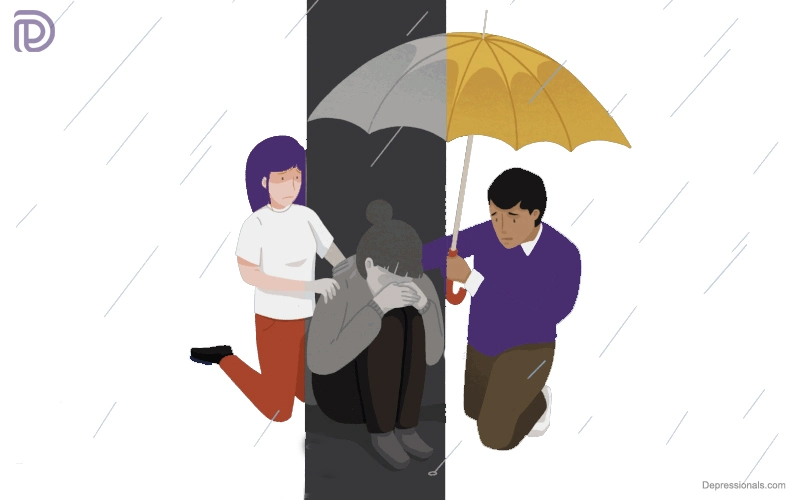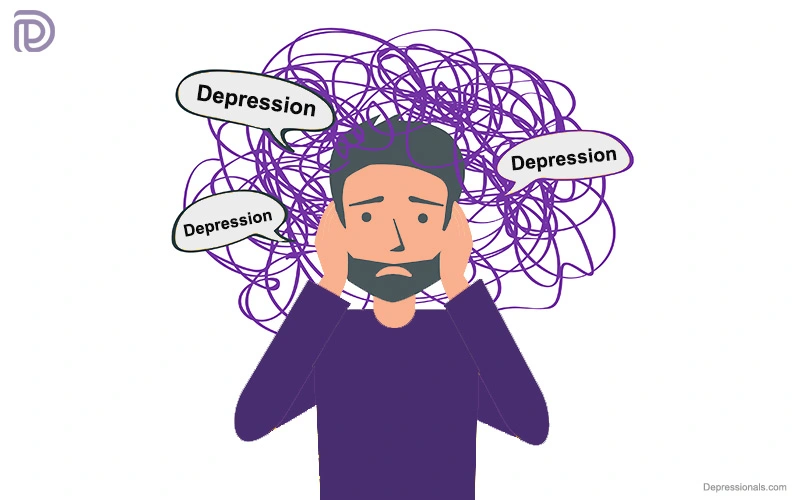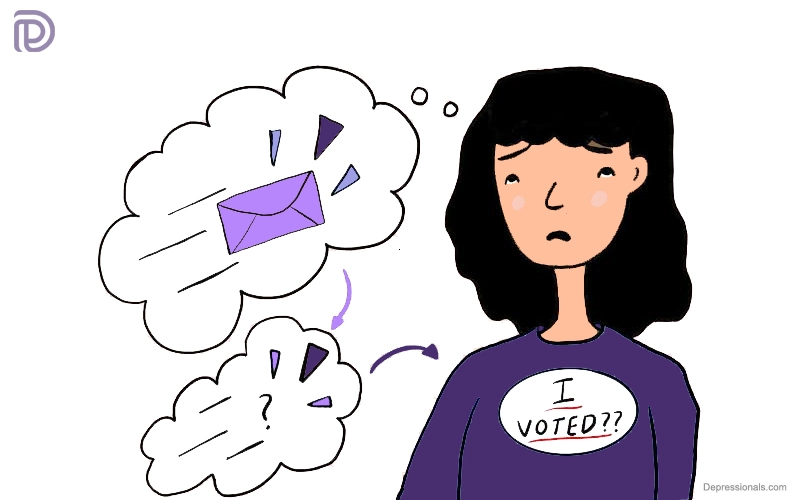You may wonder how to help someone with depression whom you love. You may even feel uncomfortable, upset and angry, depending on your perspective.
Brief overview
A person living with depression may be confused and even afraid of their everyday life, especially if they live with someone who is depressed. Depressed people might have trouble understanding what depression feels like if they have never been depressed themselves.
There may be many things you don’t know about depression, such as what causes it, how to diagnose it, or how to treat it.
Recommended: Multiple Strategies To Control Overthinking
How can I help someone with depression?
Depression affects millions of people of all ages and all walks of life, from young to old. The condition disrupts everyday life, causing tremendous pain to those who suffer from it as well as those around them.
It is possible to experience a wide range of difficult emotions when you love someone who is depressed, such as helplessness, frustration, anger, fear and guilt. Feelings like these are natural.
Dealing with the depression of a friend or family member is not easy. It can get overwhelming if you ignore your own health.
As such, providing your loved one with companionship and support is extremely beneficial. They can regain energy, optimism, and a sense of enjoyment for living by managing depression symptoms.
Make sure you learn as much as you can about depression and how to speak with a friend or loved one about it. Be sure you stay in touch with your own emotional health as you reach out – it’ll make it easier for you to provide your loved one with all the support he needs.
Identifying depression in a family member or friend
Depressive disorders are serious disorders. Depression is serious, so don’t underestimate it. A person with depression loses energy, optimism and motivation. It isn’t possible to “snap out of it” with willpower alone.
Depression’s symptoms aren’t unique to you. People with depression have difficulty connecting emotionally even with their closest family and friends. Depression is also often accompanied by hurtful words and anger outbursts. Please remember that your loved one is not speaking for you, rather the depression is.
You can’t fix a problem by hiding it. You can’t help a friend or family member who is depressed if you make excuses, cover up the problem, or lie about it. Depressed people may not seek treatment as a result.
The person you love is not unmotivated or lazy. You may feel exhausted or unable to put into action the things that may help you feel better when you suffer from depression. Keep your loved one’s spirit up and be patient as he or she starts to recover.
Depression cannot be “fixed” by anyone else. Even if you want to, you cannot relieve someone of depression or solve their problems for them. It’s not your fault that your loved one is depressed or that they aren’t happy (or what’s left of it). Ultimately, the person suffering from depression must take responsibility for her recovery.
Related: How Loneliness Affects Mental Health
Identifying depression in your loved one

First of all, family and friends can help to combat depression. The symptoms and signs of depression are essential to understand.
The problem of depression may become apparent to you before your loved one does, and your influence and concern may convince them to ask for help.
Concern yourself if a loved one:
- Nothing seems to matter to him anymore. Becomes bored with work, sex, hobbies and other pleasures. Refused to interact with family, friends and other social groups.
- An expression of gloom or negativity. Has uncharacteristic sadness, irritability, anger, criticism, or moodiness; expresses sadness or helplessness.
- Pains frequently occur in the form of headaches, stomach issues, and back pain. He or she complains of feeling drained and tired all the time.
- Lacks sleep or oversleeps. Affects their decisionmaking, memory, organization, and feeling “out of it.”
- Eating more or less than normal, and gaining or losing weight recently.
- Self-medicates by drinking or abusing drugs such as sleeping pills and painkillers to help manage their feelings.
Related: Substance/Medication-Induced Psychotic Disorder
Talking about depression with someone
Speaking to someone about depression can sometimes be difficult. Your concerns might cause the other person to feel offended, angry, or ignore them if you bring them up. Some people may wonder how to ask questions or be supportive.
Consider the following tips if you are not sure where to begin. However, remember that being an attentive listener is much more valuable than providing advice. If you are a good listener, you do not have to “fix” your family member or friend.
A person suffering from depression can often benefit greatly from simply talking to someone face-to-face. Offer to listen without judgment to the person who is depressed, and encourage them to talk about their feelings.
It won’t be over after one conversation. Those who suffer from depression often isolate themselves and withdraw from others. Your willingness to listen and express your concerns may need to be repeated over and over again. Don’t give up, but be persistent.
Check: Major Depression Disorder
Starting the conversation
Talking to a loved one about depression can be difficult. Alternatively, you could say:
- “I’ve been worried about you lately.”
- “I noticed some differences in your behavior recently, and I would like to know what is going on.”
- “I wanted to reach out to you because you seem down lately.”
Asking questions can help you get to know each other:
- “When did you start feeling this way?”
- “What happened to cause you to feel this way?”
- Can I help you in the best way possible right now?
- Is there any help you might need?
During times of depressive thinking, it is very important to speak to the depressed person in a way that will make sense to them and that they can understand.
Read: Causes of Overthinking
Talking about depression: tips and tricks
You can say these things to help:
- “You aren’t alone.” “I will stand by you during these hard times.”
- “Your feelings will change even though it may seem impossible at the moment.”
- I am willing to assist you if you will let me know what you need now.”
- I care about you and want to help, even if I don’t understand exactly how you feel.”
- “I am concerned about you.”. I value your life.”
- When you want to give up, promise yourself that you will hold on for just one more day. Then one more hour. Then another minute.
What NOT to say:
- “You’ve got it all in your head”
- “We all go through difficult times.”
- “Keep a positive attitude.”
- “What are you doing with your life when you have so much to live for?”
- “It’s impossible for me to change your situation.”
- “Stop being so crazy.”
- “It’s time for you to feel better.”
Related: Loneliness and Depression:
How to deal with a crisis
You should NEVER leave your loved ones alone if you believe that they are in immediate danger of suicide.
The National Suicide Prevention Lifeline number is 1-800-273-TALK, if you live in the U.S. Dial 911 or 1-800-273-TALK for crisis guidance.
Find a suicide prevention helpline by calling your country’s emergency services number or visiting IASP.
Risks of suicide are real
If someone close to you is depressed, it may seem impossible that they would ever consider something so drastic as suicide. A person suffering from depression is unable to make rational decisions and is affected by the reduced judgment. They believe death is the only way to cope with their pain.
Depressive people face an increased risk of suicide, so knowing the warning signs is crucial:
- Considering suicide, harming oneself, or dying; a preoccupation with mortality
- Feeling hopeless or hating yourself
- Taking risks or self-destructing actions
- Saying goodbye and sorting out affairs
- Searching for lethal objects such as pills or weapons
- Suddenly feeling calm after depression
Don’t wait to talk to a friend or family member about your concerns if you think they may be considering suicide. Although it may feel uncomfortable, telling someone you are thinking about suicide is one of the most beneficial things you can do for them.
When someone is struggling with suicidal thoughts and feelings, speaking up can save their life. Now is the time to make sure they receive the help they need!
Encourage the individual to seek help
If you want to help someone overcome depression, we recommend encouraging the depressed person to seek treatment. Treatment for depression can be difficult for depressed people.
Depressive disorders sap your loved one’s energy, so even getting up the courage to go to a doctor or schedule an appointment often feels overwhelming to them. The negative way of thinking is also part of depression.
Depression can lead a person to believe that there is no hope and there is no point in seeking treatment.
The first step in depression recovery is to help your loved one recognize that their problem is real and to help them see it can be fixed.
If your friend or relative refuses to seek help:
Consult a physician about a general check-up. Seeing a family doctor may be less challenging for your loved one than visiting a therapist. If you are experiencing depression, you may want to go to your doctor because the doctor may be able to rule out medical causes.
A doctor can refer your loved one to a psychiatrist and psychologist if they diagnose depression. The opinion of a “professional” can be crucial at times.
Take the depressed individual on his or her first visit to the doctor or therapist. It can be hard to find the right treatment provider, and it’s a process that often involves trying and failing. Having assistance making calls and researching options is a huge benefit to a depressed person.
Ensure that your loved one discusses with the doctor all symptoms and ailments they are experiencing. Observe how you feel on a regular basis and point out things such as, “You always feel worse in the mornings,” or “Every time before work, you get stomach aches.”
Related: How to Overcome Depression
Supporting the treatment of your loved one
Giving unconditional love and support throughout the treatment process is one of the most important things you can do for a friend or relative struggling with depression. Compassion and patience are necessary for dealing with depression, which often comes with negativity, hostility and moodiness.
Whenever possible, provide assistance (and accept whatever it may be). Be sure your family member keeps appointments, researches treatment options, and adheres to prescribed treatment schedules.
Be realistic in your expectations. If your friend or family member is depressed, it can be frustrating to watch them struggle. It is important to have patience. It takes time for a person to recover from depression, even with effective treatment.
Lead by example. Become an example of a positive outlook, eating healthy, avoiding alcohol and drugs, exercising, and leaning on others for support.
Engage in physical activity. Spend time with your loved one doing enjoyable activities, like seeing a funny movie or going out to eat. Exercise will help your depressed loved one feel better, so encourage them to exercise. It is easy to have fun together by going for a walk. Be persistent, but gentle-don’t give up or lose heart.
When possible, take part. Even seemingly simple tasks can be extremely challenging for someone suffering from depression. Don’t offer to do all the chores yourself, but do the best you can without getting burned out!
Related: How to Get Out of a Depressive Episode
Being kind to yourself
You should not try to fix the problems of people that you care about, since you cannot control another person’s depression. Taking care of yourself is something you can control. Take care of your own health as much as you do of the person who is depressed, so prioritize it.
Airline flight attendants advise that you should put your own oxygen mask on before helping anyone else. It’s best if you are in good health and happy before you try to help a depressed friend.
When you crumble under the stress of trying to help your friend or family member, they won’t benefit from it. When you take care of your own needs, you’ll have the energy to help others.
Take action on your behalf. When a depressed person upsets or lets you down, you may be hesitant to raise your voice. A long-term relationship is actually enhanced by truthful communication.
You will cause your loved one to feel even worse if you suffer in silence and let resentment build up. It’s best to tell someone how you feel before it’s too hard to talk sensitively with pent-up emotions.
Establish boundaries. You want to help, but there are only so many things you can do. Taking your loved one’s depression over your own life will affect your own health. Being a caregiver round the clock comes with psychological costs.
Put a clear limit on how much you’re willing and able to do to avoid burnout and resentment. Don’t take on the role of a therapist for your loved one.
Keep your life on track. Do your best to keep an appointment or a plan with your friend when caring for a friend or relative, even if some changes to routine are unavoidable. Make arrangements with a friend to accompany your loved one if he or she is not able to go on an outing or trip you planned.
Get support. It’s NOT a betrayal if you turn to others for assistance if your family member or friend is depressed. It will be helpful for you to join a support group, speak with a counselor, or confide in a trusted friend during this difficult time.
Focus on your emotions instead of detailing the suffering of your loved ones and betraying their confidences. Select a person who will listen to you without interruption, who will not judge you, and who will allow you to be completely honest with them.
Recommend: Mental Help Resources






Buenas tardes, encantado de saludarte. Soy Jose
Quería escribirte porque me ha parecido interesante comentar contigo la posibilidad de que tu negocio aparezca cada mes en periódicos digitales como noticia para posicionar en los primeros lugares de internet, es decir, con artículos reales dentro del periódico que no se marcan como publicidad y que no se borran.
La noticia es publicada por más de cuarenta periódicos de gran autoridad para mejorar el posicionamiento de tu web y la reputación.
¿Podrías facilitarme un teléfono para ofrecerte un mes gratuito?
Gracias
Very nice style and excellent subject material, nothing at all else we require 😀
fantastic points altogether, you just gained a brand new reader. What would you suggest about your post that you made a few days ago? Any positive?
Your information was helpful to me.
I appreciate the information you provided. I applied the steps and they are working. I’m satisfied. 🙂
Really helpful content.